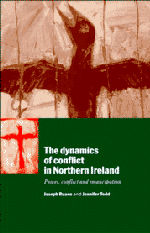Book contents
- Frontmatter
- Contents
- List of figures
- List of tables
- Preface
- 1 Introduction
- 2 Historical formations
- 3 The reconstruction of communal division
- 4 Ideology and conflict
- 5 The dynamics of conflict: politics
- 6 The dynamics of conflict: the economy
- 7 The dynamics of conflict: culture
- 8 The British context of the Northern Ireland conflict
- 9 The Republic of Ireland and the conflict in Northern Ireland
- 10 The international context
- 11 An emancipatory approach to the conflict
- Epilogue
- Appendix
- Bibliography
- Index of names
- Index of subjects
4 - Ideology and conflict
Published online by Cambridge University Press: 18 December 2009
- Frontmatter
- Contents
- List of figures
- List of tables
- Preface
- 1 Introduction
- 2 Historical formations
- 3 The reconstruction of communal division
- 4 Ideology and conflict
- 5 The dynamics of conflict: politics
- 6 The dynamics of conflict: the economy
- 7 The dynamics of conflict: culture
- 8 The British context of the Northern Ireland conflict
- 9 The Republic of Ireland and the conflict in Northern Ireland
- 10 The international context
- 11 An emancipatory approach to the conflict
- Epilogue
- Appendix
- Bibliography
- Index of names
- Index of subjects
Summary
The conflict in Ireland has been mediated by ideologies which at once express and constitute social relationships and communal interests (chapter 2). Each ideology is distinctive in its conceptual structure, embodies a specific family of concepts and is embedded in specific communal organisations and political projects; at the same time each ideology interacts with and influences others. Partition institutionalised the dominant ideologies of the pre-partition period in the new state structures. Since the 1950s there have been flows and counterflows – moderation, reaction, innovation, reconstruction – but ideological opposition and conflict have persisted. In this chapter we trace the changes and continuities and show how ideological opposition is reproduced. We begin by sketching the pre-partition origins and developing forms of these ideologies.
Ideological traditions
Loyalism
Loyalism is the oldest of the Protestant ideologies. Its origins lie in the seventeenth-century experience of colonisation and religious conflict and it posits an irreconcilable conflict between Protestant and Catholic, settler and native, loyal and disloyal. A Protestant communal identity lies at the core of the ideology, together with an insistence on the need for metropolitan support to ensure Protestant survival in Ireland. This is expressed in contractarian political terms: loyalty to the Crown is conditional on the Crown's support for Protestant rights and the Protestant community against its enemies; if support is not forthcoming the community will look to its own defence. The conflictual and unstable nature of the seventeenth-century settlement continually generated conflicts with the Catholic population which confirmed the loyalist vision.
Initially an ideology of all Irish Protestants, loyalism was particularly strong and enduring among Ulster Protestants.
- Type
- Chapter
- Information
- The Dynamics of Conflict in Northern IrelandPower, Conflict and Emancipation, pp. 84 - 115Publisher: Cambridge University PressPrint publication year: 1996



